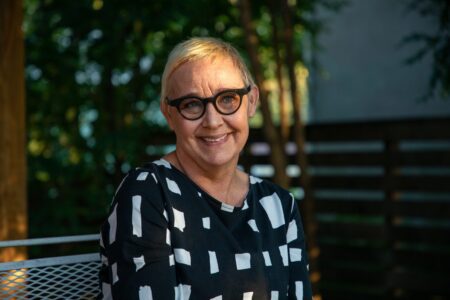New Video Oral History with Julie Bargmann, Inaugural Recipient of the Cornelia Hahn Oberlander International Landscape Architecture Prize, released by The Cultural Landscape Foundation

Photo Courtesy: Barrett Doherty courtesy
Eighteenth in an ongoing Pioneers of American Landscape Design® video oral history series that documents, collects, and preserves first-hand information from pioneering landscape architects
Washington, DC – The Cultural Landscape Foundation (TCLF) today announces the release of a new Pioneers of American Landscape Design video oral history with the landscape architect Julie Bargmann, the inaugural recipient of the Cornelia Hahn Oberlander International Landscape Architecture Prize®. This is the eighteenth in the award-winning Pioneers series, which TCLF launched in 2003 to document, collect, and preserve first-hand information from pioneering landscape architects. The 105-minute long Bargmann oral history is parsed into 25 one- to five-minute clips and organized under the themes of “biography,” “design,” and “projects.” In addition to producing and distributing the video Bargmann oral history, TCLF has produced and published a written transcript of the oral history and collected a series of written recollections from friends and colleagues. There are also video reflections by landscape architects Adriaan Geuze and Michael Van Valkenburgh.
Bargmann, a native of Westwood, NJ, is a former Professor of Landscape Architecture at the University of Virginia in Charlottesville, VA, and the founder of D.I.R.T. (“Dump It Right There”) studio. She earned a Bachelor of Fine Arts in Sculpture from Carnegie Mellon University and a Master in Landscape Architecture at Harvard’s Graduate School of Design (1987). In 1989-90 she was a Fellow in Landscape Architecture at the American Academy in Rome.
For more than thirty years as a teacher and a landscape architect, Julie Bargmann has principally focused on contaminated, neglected, and forgotten urban and post-industrial sites. According to Bargmann: “Unearthing the raw ingredients of design from waste and wastelands defines my life’s work. Both the pedagogy of my teaching and my methodology as a designer address the social and ecological imperatives to reclaim degraded land. Integrating regenerative technologies with design propositions and built landscapes embodies my contribution to the discipline of landscape architecture.” Since she started teaching and founded D.I.R.T. studio, she has created alternatives to counter the limitations of typical remediation (defined as “correcting a fault”) by offering more dynamic modes of regeneration (or “creating anew”).
For many of her recent projects, Bargmann and D.I.R.T. have acted as the conceptual design lead, working with other experts throughout the planning and design process, and sticking with many projects through construction. Multi-disciplinary collaborations with architects, historians, engineers, hydrogeologists, artists, and, most importantly, the residents of the area in which she is working, are hallmarks of Bargmann’s approach. Artistically, she is strongly influenced by the work and writings of Robert Smithson, the American artist known for his land art installations including Spiral Jetty, and the American artist Eva Hesse. Bargmann describes her approach as “rigorous intuition or intuitive rigor.”
An extensive biography of Bargmann is available on TCLF’s website.
The Bargmann oral history was shot on location in September 2021 at significant projects in Philadelphia and Detroit, and in her home in Charlottesville, VA, and in 2022 at the Vintondale Reclamation Park. The goal of the oral history series, which received the American Society of Landscape Architects 2010 Award of Excellence (Communications) is to make each practitioner’s story available to future generations of stewards, students, designers, researchers, and heritage travelers. In addition to producing and distributing the video oral history, TCLF has produced and published a written transcript of the oral history and collected a series of written recollections from friends and colleagues. Charles A. Birnbaum is the series executive producer and conducted the interviews; Barrett Doherty conducted the videotaping, drone photography and post-production editing; and Brian Cho scored the oral history.
TCLF is also grateful for the critical support received from Michael van Valkenburgh, STIMSON, Prince Concepts, the Hubbard Educational Foundation, and the American Society of Landscape Architects, which is the Partner in Education for the ongoing series.
About The Cultural Landscape Foundation
The Cultural Landscape Foundation (TCLF), founded in 1998, is a 501(c)(3) non-profit founded in 1998 to connect people to places. TCLF educates and engages the public to make our shared landscape heritage more visible, identify its value, and empower its stewards. Through its website, publishing, lectures, and other events, TCLF broadens support and understanding for cultural landscapes. TCLF is also home to the Cornelia Hahn Oberlander International Landscape Architecture Prize.


